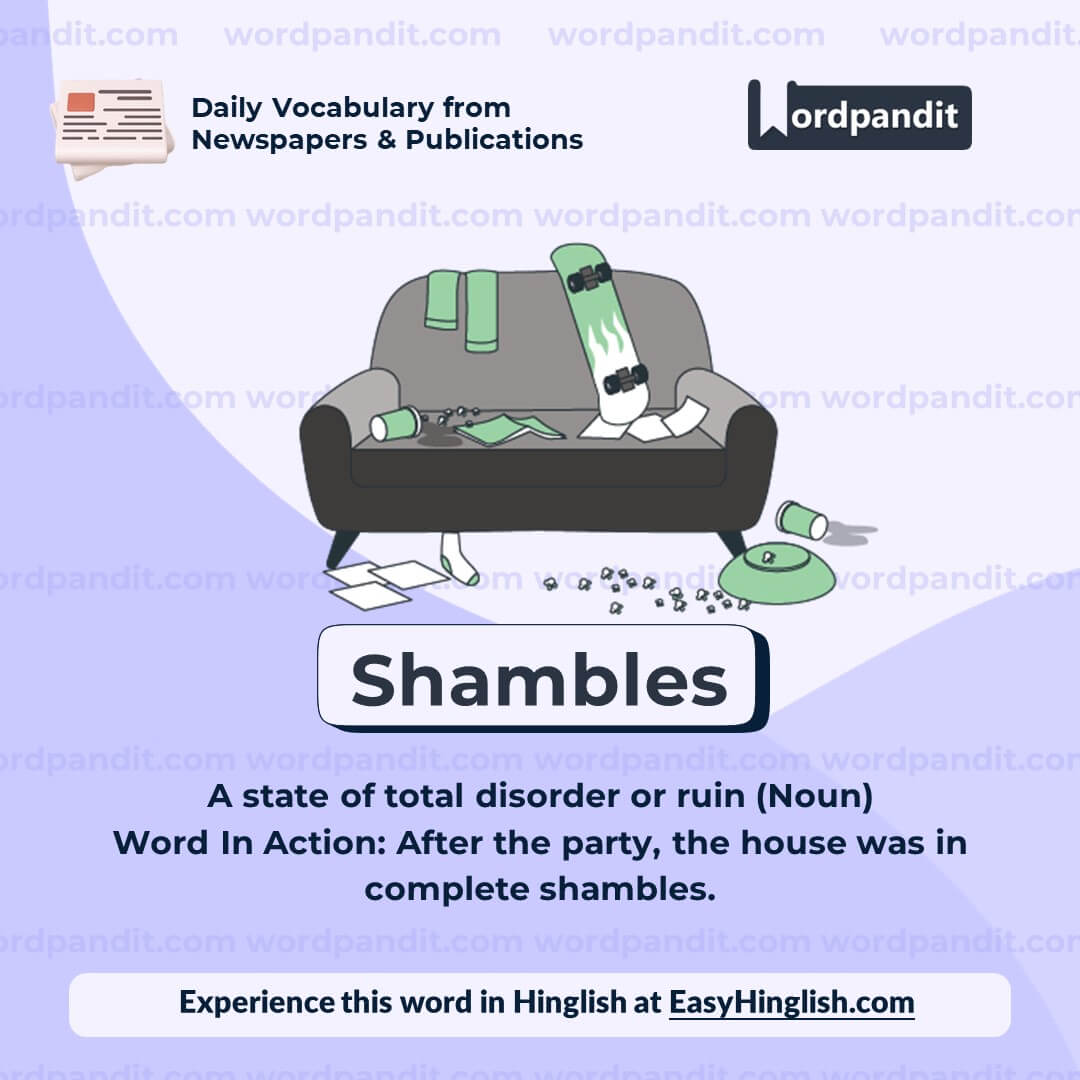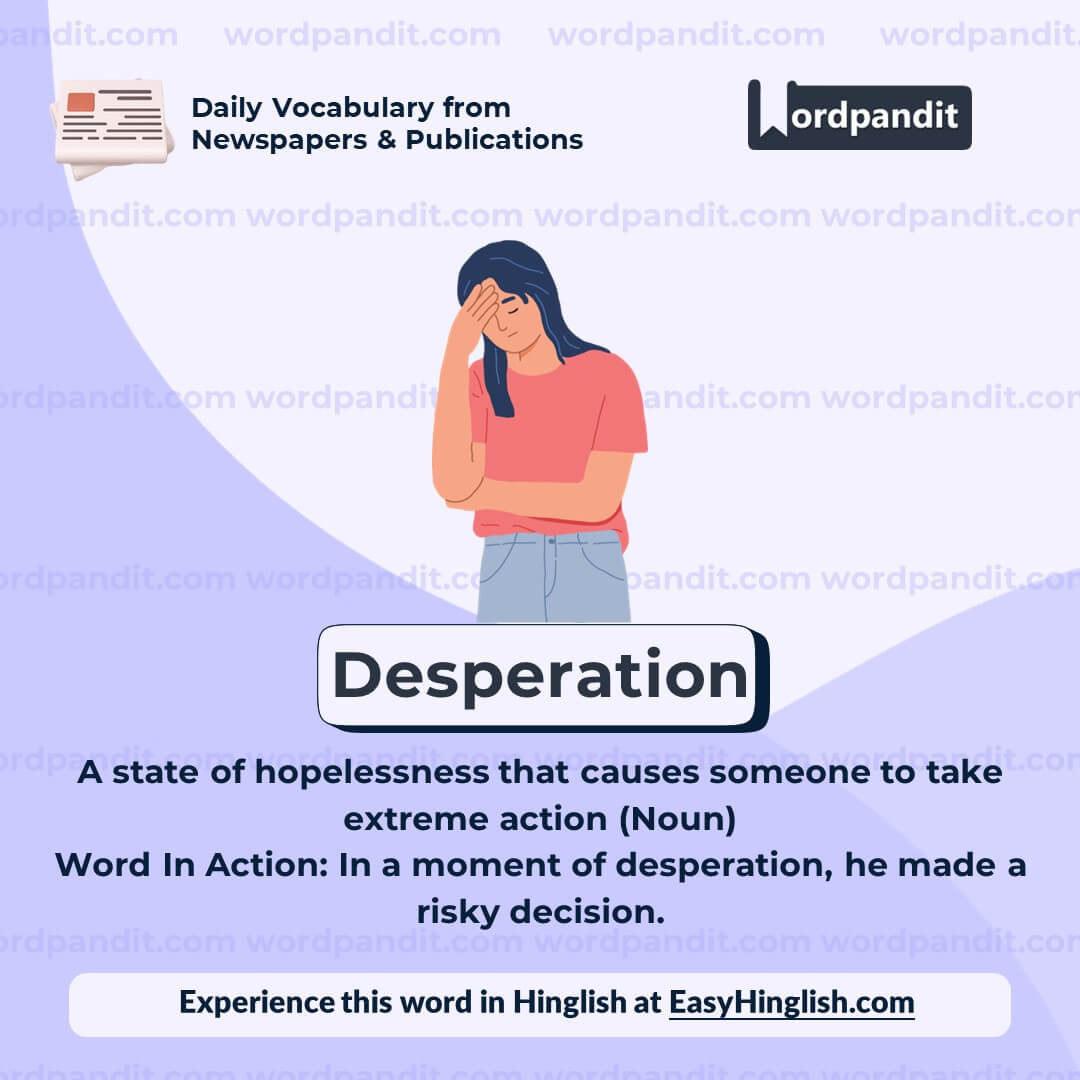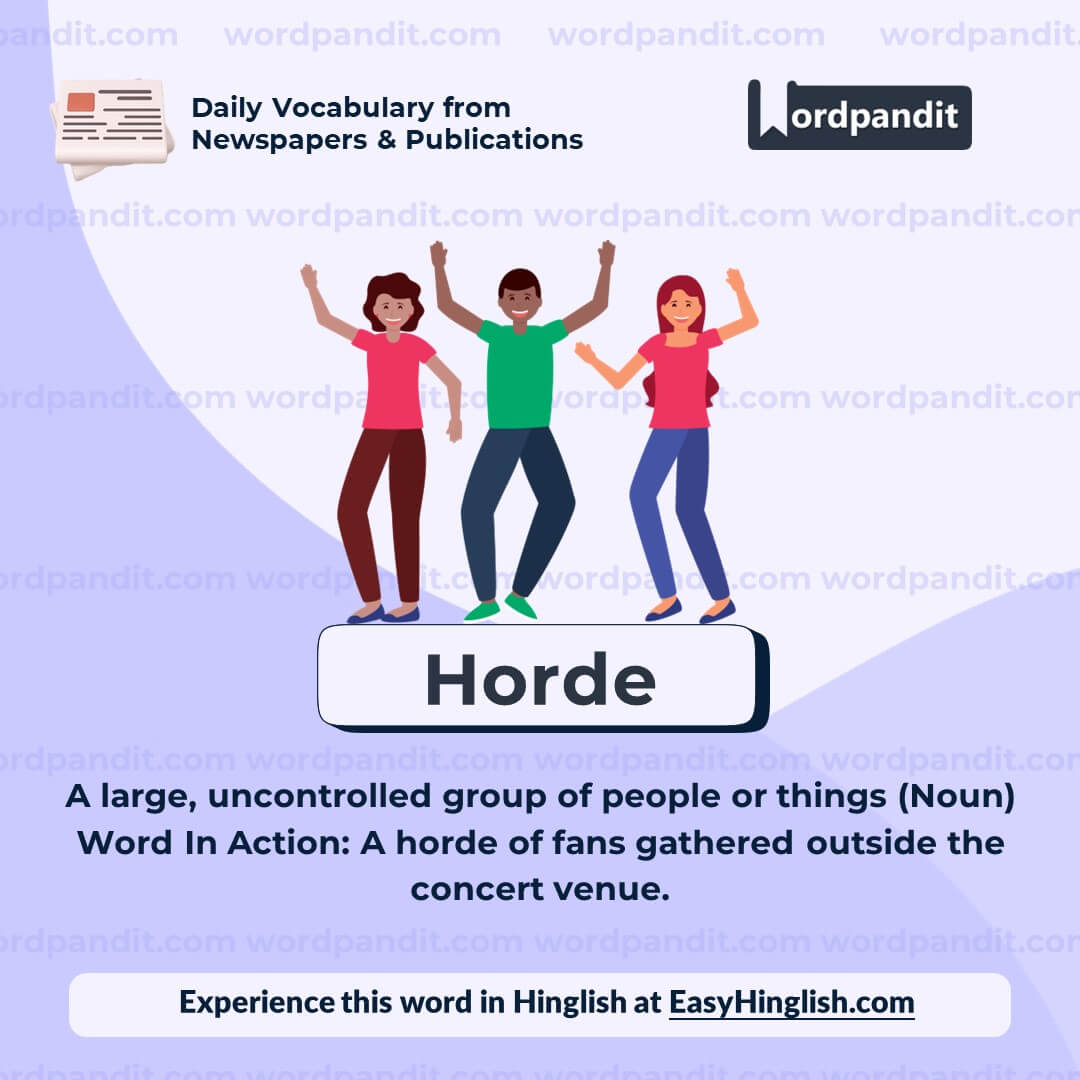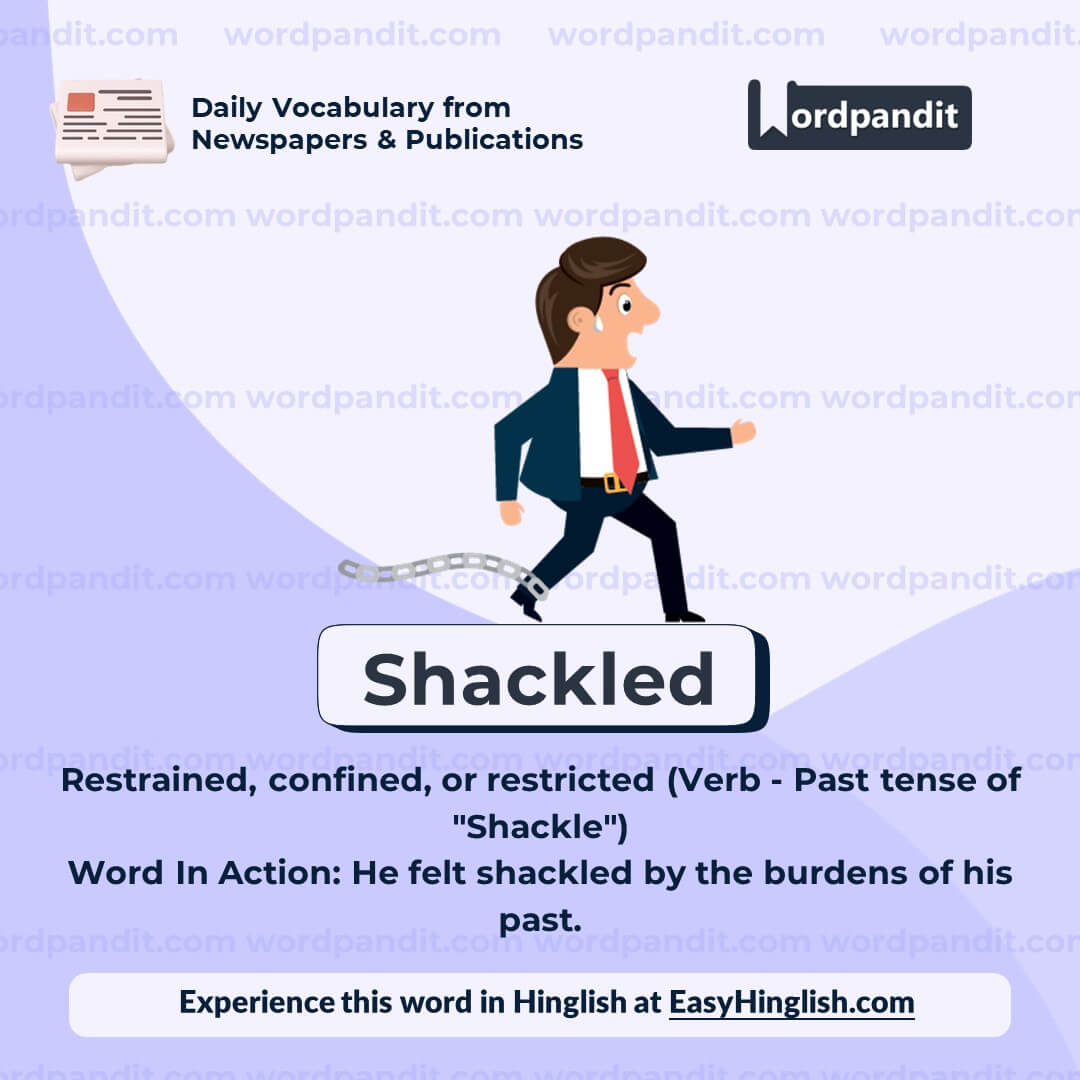Daily Vocabulary from Indian Newspapers and Publications
Welcome to Wordpandit’s Indian Vocabulary Hub
At Wordpandit, we understand the importance of staying rooted in the local context while expanding your language skills. This section focuses on enriching your vocabulary with words and phrases drawn from India’s leading newspapers and publications, ensuring you're learning vocabulary that is practical, relevant, and uniquely Indian.
Why Indian Sources Matter
We believe that the best way to master any language is by immersing yourself in local content. That’s why we carefully curate vocabulary from top Indian publications, including:
- The Hindu
- The Times of India
- The Economic Times
- Hindustan Times
- Live Mint
- The Indian Express
- And many others...
Stay Updated, Stay Relevant
With daily updates from Indian news sources, you’ll be consistently learning words that reflect the trends and shifts in Indian society and culture. Our focus is to provide vocabulary that enhances your understanding of the language in an Indian context.
How Wordpandit Supports Your Goals
Whether you’re preparing for exams, aiming to improve your professional communication, or simply want to stay connected with the latest Indian vocabulary, Wordpandit is here to guide you every step of the way.
Learn with a Practical Approach
Our interactive learning methodology includes real-world examples, engaging activities, and context-specific usage to ensure that every word becomes part of your active vocabulary.
Dive into Indian Vocabulary Today!
Why Choose Wordpandit?
Practical Learning: Focus on words you'll actually encounter in real-world reading, enhancing your comprehension and communication skills.
Diverse Content: From current affairs to scientific breakthroughs, our varied sources expose you to vocabulary across multiple domains.
Effortless Integration: Make Wordpandit a part of your daily routine. Just a few minutes each day can significantly boost your lexicon over time.
Your Path to Vocabulary Mastery
- Visit our Daily Vocabulary section regularly
- Explore new words and their usage in context
- Practice incorporating these words into your own writing and speech
- Track your progress as your vocabulary expands
Start Your Journey Today
Embark on your vocabulary enhancement journey with Wordpandit. By consistently engaging with our daily posts, you'll build a robust vocabulary that serves you well in academic, professional, and personal contexts.
Remember, a word a day keeps linguistic limitations at bay. Make Wordpandit your daily companion in the quest for vocabulary excellence!
WORD-1: Shambles
Context:
"My mental, as well as physical health, was in shambles due to excess weight and in desperation, I decided to give Spikew Tummy Trimmer a try." - The Hindu
Explanatory Paragraph:
The word "shambles" refers to a state of complete disorder or chaos. It is often used to describe situations, places, or even a person's life when things are messy, unorganized, or in ruins. In the given context, the person's health—both mental and physical—is in a deteriorated condition, emphasizing the need for urgent action.
Meaning: A state of total disorder or ruin (Noun)
Pronunciation: SHAM-buhlz
Difficulty Level: ⭐⭐⭐ Intermediate
Etymology: Derived from the Middle English word "schamel" (a stool or bench) and later associated with slaughterhouses, eventually evolving to mean chaos or destruction.
Synonyms & Antonyms:
Synonyms: Chaos, mess, disorder, wreck, turmoil
Antonyms: Order, organization, neatness, structure
Usage Examples:
- After the storm, the entire neighborhood was in shambles, with debris scattered everywhere.
- His financial situation was in shambles after he lost his job and failed to manage his savings.
- The company’s mismanagement left its operations in shambles, leading to a drastic decline in profits.
- She walked into her teenage son’s room only to find it in absolute shambles, with clothes and books strewn across the floor.
Cultural Reference:
"The economy was in shambles after the Great Depression, requiring years of recovery efforts." - A common historical reference.
Think About It:
Can you think of a time when your life or surroundings were in shambles? How did you handle it?
Quick Activity:
Write a short paragraph describing a situation where something was in shambles, and how it was fixed.
Memory Tip:
Think of a "shabby" place in total disorder—this will help you remember "shambles" means chaos.
Real-World Application:
"Shambles" is often used in news reports to describe political, economic, or social crises. It is also commonly used in personal situations to describe messy conditions, whether physical or emotional.
WORD-2: Desperation
Context:
"My mental, as well as physical health, was in shambles due to excess weight, and in desperation, I decided to give Spikew Tummy Trimmer a try." - The Hindu
Explanatory Paragraph:
"Desperation" refers to a state of extreme hopelessness or urgency, often leading to rash or bold actions. When someone acts out of desperation, it usually means they feel they have no other choice and are willing to try anything to change their situation. In the given context, the person, feeling hopeless about their health, decided to try a fitness product as a last resort.
Meaning: A state of hopelessness that causes someone to take extreme action (Noun)
Pronunciation: des-puh-RAY-shun
Difficulty Level: ⭐⭐⭐ Intermediate
Etymology: Derived from the Latin word "desperatio," from "desperare" (to lose hope), which also gives us the word "despair."
Synonyms & Antonyms:
Synonyms: Hopelessness, distress, anguish, urgency
Antonyms: Hope, confidence, reassurance, calmness
Usage Examples:
- In desperation, he sold his car to pay off his debts.
- Her desperation to find a job led her to apply for positions she never considered before.
- The team played with desperation in the final minutes, knowing they had to score to win.
- He could hear the desperation in her voice as she begged for help.
Cultural Reference:
"Desperation is sometimes as powerful an inspirer as genius." - Benjamin Disraeli
Think About It:
Can desperation be a positive force? Think of a time when it led to a breakthrough or success.
Quick Activity:
Write a short paragraph describing a situation where someone acted out of desperation and the outcome of their actions.
Memory Tip:
Think of "despair" + "action" = Desperation. It’s when hopelessness pushes someone to take drastic steps.
Real-World Application:
"Desperation" is commonly used in discussions about financial crises, sports, relationships, and survival situations. It highlights moments where people take extreme actions due to a lack of options.
WORD-3: Condonable
Context:
"Araya said, 'Not inviting other members of our family, my mother (Nadira Babbar), my sister (Juhi Babbar), or me could be condonable: maybe we failed him as a family, although we have never treated him as a stepbrother.'" - The Hindu
Explanatory Paragraph:
The word "condonable" refers to something that can be excused, forgiven, or overlooked. If an action is condonable, it means that, despite being a mistake or wrongdoing, it is still acceptable under certain circumstances. In the given context, the speaker suggests that not inviting certain family members might be forgivable, possibly because of their past failures in supporting the person in question.
Meaning: Capable of being forgiven or overlooked (Adjective)
Pronunciation: kuhn-DOH-nuh-buhl
Difficulty Level: ⭐⭐⭐ Intermediate
Etymology: Derived from the Latin word "condonare," meaning "to give away" or "pardon," which later evolved into "condone" in English.
Synonyms & Antonyms:
Synonyms: Forgivable, excusable, tolerable, justifiable
Antonyms: Unforgivable, inexcusable, unacceptable, intolerable
Usage Examples:
- His rude behavior was not condonable, even though he apologized later.
- Some believe that minor mistakes are condonable, while others hold everyone accountable for their actions.
- The judge ruled that the employee’s negligence was not condonable, leading to strict consequences.
- Forgetting a friend’s birthday might be condonable, but completely ignoring them for months is not.
Cultural Reference:
"Injustice anywhere is a threat to justice everywhere." - Martin Luther King Jr. This quote highlights that some actions, even if seemingly minor or condonable, can have larger consequences.
Think About It:
What are some actions that you believe are condonable? Are there situations where forgiveness should not be given?
Quick Activity:
Write a short paragraph discussing whether lying in certain situations is condonable. Justify your answer.
Memory Tip:
Think of "condone" (to forgive) + "-able" (capable of) = "Condonable" means something that can be forgiven.
Real-World Application:
The concept of "condonable" is often discussed in ethics, law, and everyday life. It plays a role in determining whether mistakes, crimes, or social behaviors deserve forgiveness or punishment.
WORD-4: Horde
Context:
"The delay of two trains, a horde of passengers waiting on platform number 14, and an announcement for a special train—these factors, coupled with the alleged lack of management by the administration, led..." - The Hindu
Explanatory Paragraph:
The word "horde" refers to a large crowd or group of people, often suggesting chaos, urgency, or disorder. It is commonly used to describe large gatherings in public places, such as markets, train stations, or protests. In the given context, "a horde of passengers" implies an overwhelming number of travelers waiting at the platform, likely leading to confusion and congestion.
Meaning: A large, uncontrolled group of people or things (Noun)
Pronunciation: hord
Difficulty Level: ⭐⭐ Beginner
Etymology: Derived from the Mongolian word "ordu," meaning "camp" or "military unit," which later came to mean a large, moving group of people in English.
Synonyms & Antonyms:
Synonyms: Crowd, swarm, throng, mob
Antonyms: Few, handful, small group
Usage Examples:
- A horde of fans gathered outside the stadium to catch a glimpse of their favorite player.
- As soon as the store opened on Black Friday, a horde of shoppers rushed inside.
- The hikers were surprised to see a horde of wild animals blocking their path.
- Tourists in hordes visit the historic city during the peak season.
Cultural Reference:
In historical contexts, "horde" is often associated with the Mongol Horde, the massive army led by Genghis Khan that conquered vast territories in the 13th century.
Think About It:
Do you think large crowds (hordes) are always chaotic, or can they be well-organized under certain circumstances?
Quick Activity:
Write a sentence using "horde" in a different context, such as in a fantasy story or a historical event.
Memory Tip:
Think of "horde" as a huge crowd moving like a storm, overwhelming everything in its path.
Real-World Application:
The word "horde" is frequently used in news reports about large gatherings, sports events, protests, or even online gaming (e.g., "a horde of zombies" in video games).
WORD-5: Shackled
Context:
"The cartoon showed Prime Minister Narendra Modi sitting shackled next to US President Donald Trump." - The Hindu
Explanatory Paragraph:
The word "shackled" refers to being physically or metaphorically restrained, restricted, or bound by something. Originally, shackles were metal chains used to confine prisoners, but the term is often used figuratively to describe a lack of freedom, control, or independence. In the given context, the cartoon likely implies that Prime Minister Modi is being controlled, limited, or restrained in some way while sitting next to Donald Trump.
Meaning: Restrained, confined, or restricted (Verb - Past tense of "Shackle")
Pronunciation: SHAK-uhld
Difficulty Level: ⭐⭐⭐ Intermediate
Etymology: Derived from the Old English word "sceacul," meaning "fetters" or "chains," later evolving into "shackle," referring to restraints.
Synonyms & Antonyms:
Synonyms: Restrained, bound, confined, chained
Antonyms: Freed, liberated, unchained, unshackled
Usage Examples:
- The prisoner sat shackled in the courtroom, awaiting his verdict.
- Many people feel shackled by societal expectations and traditions.
- Debt had shackled him for years, preventing him from pursuing his dreams.
- The new policy aims to unshackle businesses from unnecessary regulations.
Cultural Reference:
"Shackles of oppression" is a phrase commonly used in history and literature to describe slavery, colonial rule, or restrictions on freedom.
Think About It:
In what ways do people today feel shackled, and how can they break free from those limitations?
Quick Activity:
Write a short paragraph using "shackled" to describe a situation where someone feels restricted or controlled.
Memory Tip:
Think of a prisoner in chains—"shackled" means being restrained, physically or metaphorically.
Real-World Application:
The word "shackled" is widely used in political debates, discussions on freedom, and social issues, symbolizing restriction or oppression.



















